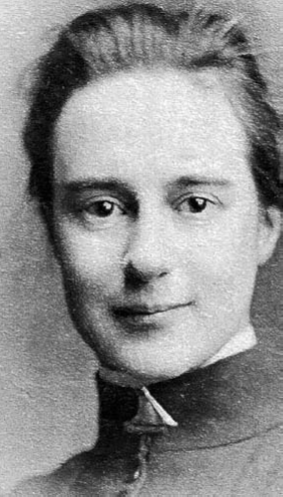Partner Mabel
Jones, Mary Murdoch, Cicely Lamorna Hingston,
Marguerite du
Pre Gore Lindsay
Queer Places:
3 Palmeira Terrace,
37 Church Rd, Hove BN3 2BW, UK
Aldrington House, 35 New Church Rd, Hove BN3 4AG, UK
Rockrose, Clayton Hill, Pyecombe, Brighton BN45 7FF, UK
9 The Drive, Hove BN3 3JE, UK
49 Harley St, Marylebone, London W1G 8BT, UK
.jpg) Alice
Helen Anne Boyle (November 19, 1869 – November 20, 1957)[1] was
an Irish-British physician and psychologist.[2]
Dr Helen Boyle, the founder of mental healthcare in Sussex, had a series of
relationships with women, including Drs
Mabel
Jones and Mary Murdoch. One of
Louisa "Lulu" Martindale and Ismay FitzGerald’s
closest friends on the south coast was Dublin-born Dr
Helen Boyle, who ran a general practice in
Hove with her partner Dr
Mabel
Jones.
Alice
Helen Anne Boyle (November 19, 1869 – November 20, 1957)[1] was
an Irish-British physician and psychologist.[2]
Dr Helen Boyle, the founder of mental healthcare in Sussex, had a series of
relationships with women, including Drs
Mabel
Jones and Mary Murdoch. One of
Louisa "Lulu" Martindale and Ismay FitzGerald’s
closest friends on the south coast was Dublin-born Dr
Helen Boyle, who ran a general practice in
Hove with her partner Dr
Mabel
Jones.
When
Boyle arrived in Brighton in 1897, she and her partner,
Mabel
Jones were the first women doctors to set up in general practice in the
district. A
later partner of Helen Boyle’s,
Cicely Lamorna Hingston, lived during her
student days with the first woman stockbroker,
Beatrice Gordon Holmes who went
by the name of Gordon Holmes and had no problem identifying herself as a ‘real
lesbian’. Helen spent the last seventeen years of her life with
Marguerite du
Pre Gore Lindsay who continued to occupy Helen’s cottage in Pyecombe until her
own death in 1977.
Boyle was Brighton's first
female general
practitioner, and the first female president of the Royal
Medico-Psychological Association (now the Royal College of Psychiatrists).
Boyle had a passion for helping women with mental illness in poverty and used
this to begin an era of proper treatment for mental disorders.
Helen Boyle was born in Dublin,
Ireland, in 1869, and studied in France and Germany, before moving to England
in 1887.[1][3] She
studied at the London
School of Medicine for Women from 1890 to 1893, under Elizabeth
Garrett Anderson.[1] In
1893, she qualified through the Scottish triple examination which allowed
Scottish medical schools to equalise with other schools globally. Boyle became
licensed in the Royal
College of Physicians of Edinburgh and the Royal
Faculty of Physicians and Surgeons of Glasgow and completed a Doctor
of Medicine (MD) degree in Brussels in
1894.[1]

From 1894 to 1897, Boyle worked as an assistant medical officer at Claybury
Hospital, where she focused on neurological
disorders, as well as the Canning
Town Mission Hospital. During her time in the East
End of London, she was shocked by the way patients had to deal with
emotional stress.[1][3][4][5] While
there, she became the first psychiatrist to identify bacillary dysentery among
mental health patients in the facility. Boyle later became the medical
superintendent at Canning Town Mission Hospital in the East End of London. As
a result of the first hand experience she gained in working with mentally ill
women in poverty, she was inspired to start her own facility.
In 1897 Boyle moved to Hove and, along with Dr Mabel Jones, set up a
General Practice at 3 Palmeira Terrace, 37 Church Road; together they became
the first women doctors in Brighton. Soon though, Dr Boyle was devoting the
majority of her time to the Lewes Road Dispensary for Women and Children in
Islingword Road – the first and only dispensary of its kind in Brighton to
offer free or low-cost treatment to women who could not afford normal GP’s
charges. Regardless of opposition, the venture was a huge success and, in
1905, led to the opening of ten beds for the treatment of in-patients at 101
Roundhill Crescent. Dr Boyle recognised that, “If anyone needs an entire
change of life and surroundings in order to get better surely it is the poor”.
The work rapidly grew and, in 1911, a lease was taken out on 70 Brunswick
Place, Hove, making it possible to admit a total of 38 in-patients. In 1920, a
large house, Aldrington House, in New Church Road was purchased as premises
for the Lady Chichester Hospital for Women and Children with Nervous Diseases.
In 1929, Boyle moved to Pyecombe,
West Sussex and she died there in November 1957, one day after her 88th
birthday.[3][5] She
was pioneer in mental health care for women.[4][6]
In 2015, a blue plaque at Aldrington House
was erected for her, and a Brighton
& Hove bus has been named in her honour.[3][7]
My published books:


BACK TO HOME PAGE

.jpg) Alice
Helen Anne Boyle (November 19, 1869 – November 20, 1957)[1] was
an Irish-British physician and psychologist.[2]
Dr Helen Boyle, the founder of mental healthcare in Sussex, had a series of
relationships with women, including Drs
Mabel
Jones and Mary Murdoch. One of
Louisa "Lulu" Martindale and Ismay FitzGerald’s
closest friends on the south coast was Dublin-born Dr
Helen Boyle, who ran a general practice in
Hove with her partner Dr
Mabel
Jones.
Alice
Helen Anne Boyle (November 19, 1869 – November 20, 1957)[1] was
an Irish-British physician and psychologist.[2]
Dr Helen Boyle, the founder of mental healthcare in Sussex, had a series of
relationships with women, including Drs
Mabel
Jones and Mary Murdoch. One of
Louisa "Lulu" Martindale and Ismay FitzGerald’s
closest friends on the south coast was Dublin-born Dr
Helen Boyle, who ran a general practice in
Hove with her partner Dr
Mabel
Jones.

